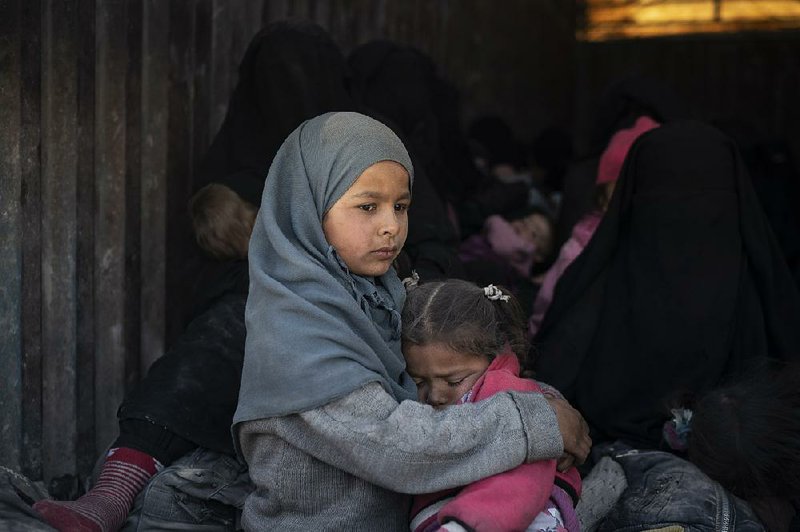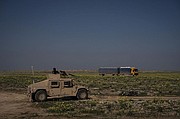BAGHOUZ, Syria -- A convoy of trucks carrying hundreds of men, women and children left the last enclave held by Islamic State militants in eastern Syria on Wednesday, signaling a possible end to a standoff that has lasted more than a week.
The tiny enclave on the banks of the Euphrates River is the final scrap of territory left to the extremist group that only a few years ago controlled a vast stretch of territory across Syria and Iraq -- at one point nearly from Aleppo to Baghdad -- aspiring to create an enduring and expanding jihadi state. Its recapture by U.S.-backed Syrian fighters would spell the territorial defeat of the Islamic State and allow President Donald Trump to begin withdrawing American troops from northern Syria, as he has pledged to do, opening a new chapter in Syria's eight-year civil war.
Few believe, however, that ending the group's territorial rule will end the threat posed by an organization that still stages and inspires attacks through sleeper cells in Syria and Iraq.
Some 300 Islamic State militants -- many of them foreign fighters -- are believed to be holed up in the enclave in the remote village of Baghouz, along with several hundred civilians believed to be mostly family members.
The presence of many civilians intermingled with the militants in a crammed space halted the military offensive by the U.S.-backed militia known as the Syrian Democratic Forces and led to a dayslong standoff with the militants. Syrian Democratic Forces officials say the militants have refused to surrender and had, at least initially, prevented the civilians from leaving.
Mustafa Bali, spokesman for the Syrian Democratic Forces, said an operation by special forces enabled the evacuation. He didn't elaborate.
Fighters have said food supplies and ammunition for the besieged militants have been quickly diminishing.
An Associated Press team in Baghouz counted at least 22 trucks that emerged from the enclave. In past weeks, nearly 20,000 people have walked for hours through a humanitarian corridor to exit the militants' last patch of territory along the river. Many paid smugglers and some have come under fire from the militants for attempting to leave.
Bali said there are still more civilians among the militants and the Syrian Democratic Forces would continue efforts to evacuate them. The militants refusing to surrender will face a military operation, he said.
Reporters who gathered to witness the evacuation were not permitted to speak to the civilians. Bali said the exiting civilians were not screened and it was not clear if they included militants.
On Wednesday, the trucks snaked through the rugged grass-topped hills separating the Islamic State-held enclave from the reception area -- a plateau with many defense positions for Syrian Democratic Forces fighters.
Women, children and men, some with checkered headscarves, or keffiyehs, could be seen through flap openings on the flatbed trucks. One man carried a crutch; the women were swaddled in conservative black garments covering their faces known as niqabs. Many of the children looked terrified.
There were reports of Islamic State militants surrendering, but the U.S.-led coalition said those reports could not be independently verified. In a tweet, it said the Syrian Democratic Forces continue to receive civilians attempting to escape to safety and the most hardened Islamic State fighters still remain in Baghouz.
The number of those evacuated was not clear, nor whether Islamic State militants were also on board the trucks. Bali said a record of those evacuated would be made available later.
On Tuesday, Bali said a military operation aimed at ousting the extremists from the area will begin if they don't surrender, adding that such an operation would take place after separating or evacuating the civilians from the militants.
A Syrian Democratic Forces commander, Zana Amedi, said most of the militants remaining inside the enclave are seriously wounded or sick.
U.S. ACCUSED
Separately, Syria accused the U.S. of sabotaging improved ties with Arab nations that could be key to rebuilding the war-shattered country.
The U.S. has pressured allies to block Syria's reinstatement into the Arab League, President Bashar Assad's media adviser, Buthaina Shaaban, said in an interview Tuesday in Moscow. The restoration of Syria's suspended membership could be more than symbolic, potentially transforming Damascus' ties with the rest of the region and unlocking much-needed Persian Gulf funding to rebuild after eight years of civil war.
U.S. Secretary of State Mike Pompeo "went to the Gulf states and sent someone to Lebanon in order to stop the normalization of relations with Syria," Shaaban said on the sidelines of a Middle East conference hosted by the Kremlin-backed Valdai Club. "It is an open secret really that the Americans are the ones who issued orders because they want to complete their agenda in Syria."
As Syria's war winds down, relations have been improving between Assad's government and some Arab countries. The United Arab Emirates and Bahrain reopened their embassies in Damascus in December. The Arab League is to meet in Tunisia in March, but readmitting Syria is not on the agenda. The league's secretary-general, Ahmed Aboul Gheit, has said there was still no consensus.
The Kremlin's military intervention in Syria since 2015 shored up Assad at a time when he was at risk of being overthrown in a rebellion backed by the U.S. and its allies. The United Nations estimates the cost of reconstruction in Syria at $250 billion, and the Syrian leadership can't count on significant financing from either of its two main supporters, Iran and Russia.
"Western countries do not want reconstruction to start in Syria but I think the Syrian people have started their reconstruction anyway," Shaaban said. "So we really depend on ourselves in this sense."
U.S. and European Union leaders say Assad is largely responsible for the deaths of hundreds of thousands of people during the war and stability is impossible under his rule.
Still, Shaaban voiced optimism that the country is on the verge of regaining full control of territory with the planned U.S. withdrawal from northeastern Syria and the expected military campaign against an enclave held by an al-Qaida offshoot in the northwestern Idlib province.
"We are not only hopeful, we are determined that we will regain the sovereignty over our country," she said.
Assad, whose current term ends in 2021, "absolutely" has the right to run for re-election, said Shaaban, who criticized what she described as efforts by outside powers to impose political reforms, including a new constitution, under a UN-led process.
Information for this article was contributed by Sarah El Deeb of The Associated Press and by Henry Meyer of Bloomberg News.
A Section on 02/21/2019

